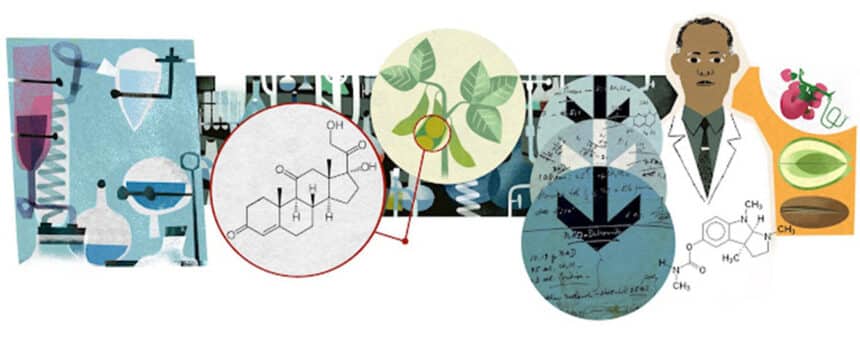Image Courtesy: Google Doodle
Percy Julian (11 April 1899 – 19 April 1975) was an American research chemist and a pioneer in the chemical synthesis of medicinal drugs from plants. He was the first to synthesize the natural product physostigmine and was a pioneer in the industrial large-scale chemical synthesis of the human hormones progesterone and testosterone from plant sterols such as stigmasterol and sitosterol.
Life and Career
He was born on 11 April 1899, in Montgomery, Alabama, during a time of racial segregation and discrimination in the United States.
Despite facing numerous challenges due to his race, Julian excelled academically and earned a Bachelor of Arts degree from DePauw University in 1920. He then went on to obtain a Master of Arts degree in chemistry from Harvard University in 1923, becoming the first African American to earn a master’s degree in chemistry from the prestigious institution. Julian later earned a Ph.D. in chemistry from the University of Vienna, Austria, in 1931, where he conducted groundbreaking research on the synthesis of plant hormones known as gibberellins.
In 1935, Julian joined the faculty at DePauw University as a chemistry professor, and he continued his research on natural product chemistry, focusing on the synthesis of complex organic molecules from plant sources. His innovative work led to the development of new methods for synthesizing important compounds such as progesterone, which is used in birth control pills, and physostigmine, which is used to treat glaucoma.
In 1942, Julian joined the Glidden Company as its director of research, becoming the first African American to hold such a position in a major chemical company. During his time at Glidden, Julian made significant advancements in the field of soybean chemistry, developing new processes for extracting valuable compounds from soybeans, such as soy protein and soybean oil.
In 1950, Julian founded his own chemical consulting firm, Julian Laboratories, which later became Julian Research Institute. He continued his research on synthetic chemistry, particularly in the area of medicinal chemistry, and obtained numerous patents for his inventions. His work on the synthesis of cortisone, a powerful anti-inflammatory drug, and its derivatives helped to revolutionize the treatment of conditions such as rheumatoid arthritis.
Throughout his career, Julian faced discrimination and racism, but he remained dedicated to his work and made groundbreaking contributions to the field of chemistry.
Percy Julian’s life and career were marked by his perseverance, innovation, and determination to overcome racial barriers in the field of chemistry. His work has had a lasting impact on the fields of synthetic chemistry and medicinal chemistry, and his legacy continues to inspire aspiring scientists today.
Percy Julian died on 19 April 1975, but his contributions to science and society continue to be remembered and celebrated.
Award and Legacy
During his lifetime, Percy Julian received numerous awards and honors in recognition of his groundbreaking contributions to the field of chemistry. Some of the notable awards he received include:
- Spingarn Medal: Julian was awarded the Spingarn Medal by the National Association for the Advancement of Colored People (NAACP) in 1947. This prestigious award recognizes outstanding achievements by African Americans and is considered one of the highest honors in the African American community.
- National Academy of Sciences: Julian was elected to the National Academy of Sciences in 1973, becoming the first African American to be elected to this prestigious scientific organization. This was a significant recognition of his contributions to the field of chemistry and his impact on the scientific community.
- Fellow of the American Chemical Society: Julian was elected as a Fellow of the American Chemical Society (ACS) in 1950, which is a distinction given to individuals who have made significant contributions to the field of chemistry. He was also the first African American to be elected as a Fellow of the ACS.
Julian’s legacy is far-reaching and impactful. His innovative work in synthetic chemistry and medicinal chemistry has had a lasting impact on fields such as pharmaceuticals, agriculture, and materials science. His research and inventions have led to the development of important drugs and chemicals that have improved the lives of millions of people.
In addition to his scientific contributions, Julian’s life and career have also inspired generations of aspiring scientists, particularly African Americans and other underrepresented minorities. His perseverance in the face of discrimination and his unwavering dedication to his scientific pursuits serve as a powerful examples of resilience, excellence, and breaking barriers.
Julian’s legacy also includes his efforts in promoting diversity and inclusion in the field of chemistry. He advocated for increased opportunities for African American scientists and worked to break down racial barriers in the scientific community. His pioneering achievements have paved the way for greater representation of minorities in the field of chemistry and beyond.
Overall, Percy Julian’s awards and legacy reflect his significant contributions to the field of chemistry, his impact on society, and his enduring inspiration as a trailblazer for minority scientists. His work and achievements continue to be recognized and celebrated, and he remains a celebrated figure in the history of chemistry and a symbol of excellence and perseverance.
On 11 April 2014, Google celebrated Percy Julian’s 115th Birthday with a doodle.

